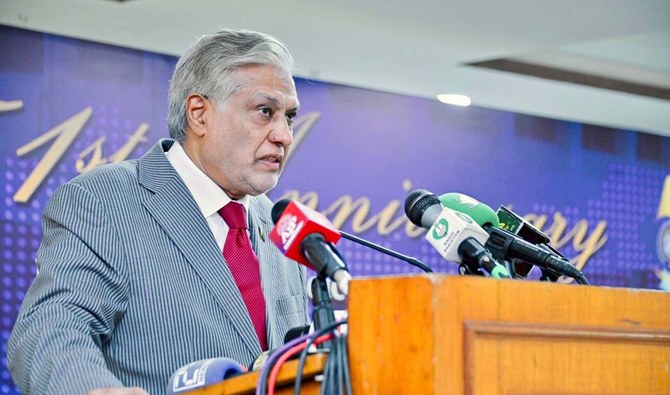ISLAMABAD: Pakistan’s Deputy Prime Minister Ishaq Dar on Tuesday called for a “sober reflection” on the future of Islamabad’s strained ties with New Delhi, a day after Indian Prime Minister Narendra Modi and his newly elected ministers took oath as lawmakers.
Modi and members of his Council of Ministers took oath as members of the lower house of India’s parliament during its first session on Monday. Relations between India and Pakistan, two nuclear-armed neighbors who have fought three wars, remain strained since August 2019 when India stripped the disputed Jammu and Kashmir region of its autonomy.
India and Pakistan claim the Himalayan region in full but administer only parts of it. Both have fought two wars over the disputed territory since gaining independence from British colonial India in 1947.
Pakistan downgraded ties with New Delhi after it stripped Kashmir of its autonomy in 2019 and suspended trade with its neighbor. Islamabad has ruled out normalizing ties with India unless it revokes its controversial decision, which India has refused to do so.
“In our view, as the BJP-led NDA government starts a new term, it is time for a sober reflection on the future of India-Pakistan relations and the cross-cutting issues affecting the entire region,” Dar said during an event in Islamabad.
The deputy prime minister said Pakistan’s relationship with India had historically remained troubled. However, he said Islamabad does not believe in perpetual hostility.
“We seek good neighborly relations with India based on mutual respect, sovereign equality and a just and peaceful resolution of the long-standing Jammu and Kashmir dispute,” he said.
While Pakistan has always been receptive to constructive engagement via dialogue to resolve outstanding issues, Dar said Islamabad would never agree to India’s “unilateral approaches” or attempts to impose its hegemony in the region.
“We will also take every step needed to maintain strategic stability in South Asia and would respond effectively and decisively to any ill-considered military misadventure by the Hindutva driven dispensation in New Delhi,” he warned.
‘PRAGMATIC’ AFGHANISTAN APPROACH
Speaking on Pakistan’s ties with Afghanistan, Dar hoped Kabul would recognize that it is in Afghanistan’s interest to take practical steps necessary to address Islamabad’s concerns.
Relations between Pakistan and Afghanistan have deteriorated since 2021 when the Afghan Taliban seized Kabul. Pakistan has witnessed a surge in militant attacks on its western provinces that share a border with Afghanistan. Islamabad accuses Kabul of sheltering militants that launch attacks on its soil, allegations that Afghanistan have always denied.
“Since the Taliban takeover in August 2021, Pakistan has followed a pragmatic approach focused on practical cooperation aimed at averting any humanitarian crisis in Afghanistan and facilitating the well-being of the 40 million Afghan people,” Dar noted.
On relations with China, the deputy prime minister said both countries recently agreed to upgrade their flagship China-Pakistan Economic Corridor (CPEC) project, which he said in the coming years would focus on industrialization, digitalization, green transition agriculture, and people-to-people exchanges.
Beijing is investing over $65 billion in energy and infrastructure projects in Pakistan as part of the CPEC, a key element of its Belt and Road initiative. The corridor will connect China to the Arabian Sea and help modernize Pakistan’s economy through a network of roads, railways, pipelines, and ports.
However, attacks on Chinese nationals in Pakistan over the past few months have caused Beijing to worry about the safety of its citizens in Pakistan.
“We will do everything possible to ensure the safety and security of Chinese personnel and projects in Pakistan and to safeguard CPEC against the machinations of inimical forces,” Dar vowed.
Dar said Pakistan is striving to forge deeper partnerships with Gulf states, Turkiye, Iran, and Central Asian states amid Islamabad’s push for foreign investment.
“Our primary focus is on forging closer trade and investment ties and increasing regional connectivity,” he explained. “In this regard, the Special Investment Facilitation Council (SIFC) is playing a significant role,” he said, referring to a government body formed last year to attract investment in Pakistan’s key economic sectors.
















